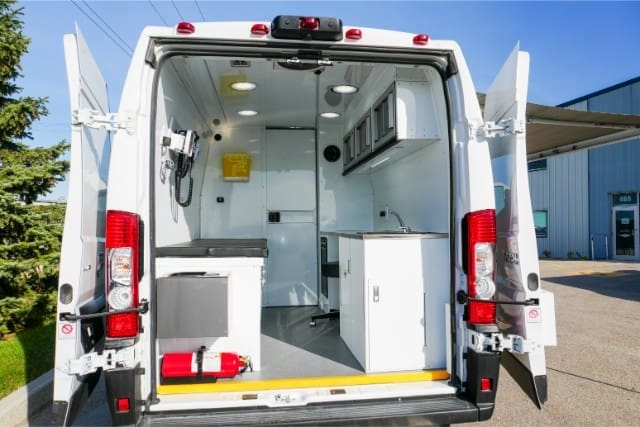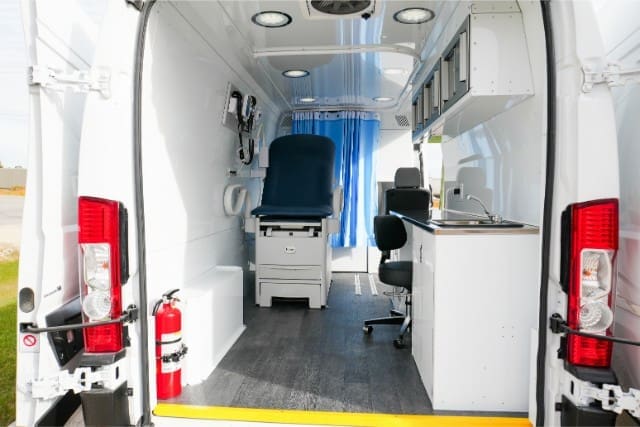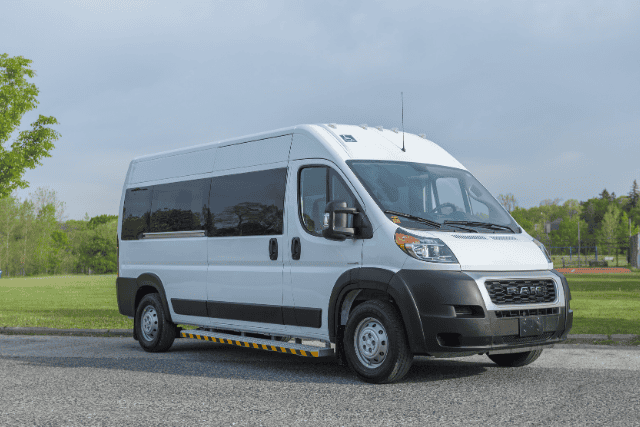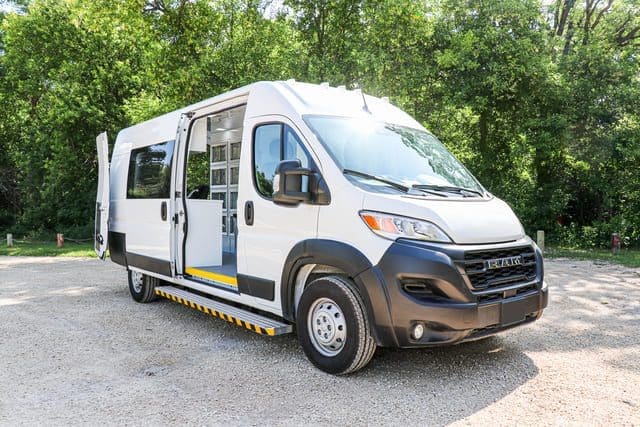If you’re here, you likely work with an organization that wants to provide healthcare to veterans. Maybe you’ve seen the barriers they face—especially those in rural or underserved areas. Veterans often miss out on care because they can’t access services close to home.
Some may even go without the healthcare they need, especially if they’re homeless. The problem is real, and it’s urgent. But what can you do about it? A mobile veterans clinic may be your answer. With a mobile veterans clinic, you can:
- Bring care directly to veterans
- Reduce delays in healthcare
- Address the mental health stigma that veterans face
- Help connect veterans to helpful resources in the community
At AVAN Mobility, we’ve spent over 10 years making custom vehicles that remove barriers to healthcare and transportation. We’re not just here to sell vehicles—we’re here to save lives. While we know we’re not the only option, our experience makes us a reliable partner in mobile health solutions. Check out some of the mobile medical units we’ve made for the Community Clinic of Southwest Missouri and CalOptima.
In this article, we’ll explore some of the barriers that veterans face and how you can use a mobile veterans clinic to fill in the gap to these barriers.
Five healthcare barriers veterans in the U.S. face
Did you know that veterans aren’t automatically covered by the Veterans Affairs (VA) healthcare system? Many people assume that once someone has served, they’re guaranteed healthcare for life. But that’s not always the case. Accessing healthcare for veterans can be complicated, especially when there are various hurdles to navigate.
Here are five of the biggest barriers to healthcare for veterans:
1. Eligibility and limited VA coverage
Not all veterans qualify for VA healthcare, and even those who do might not receive full coverage. This leaves veterans without access to all the care they need. Veterans may wonder, Do veterans get free healthcare for life? The answer, sadly, is no. VA benefits often depend on factors like service duration, disability status, and income.
2. Geographic limitations

Many veterans live in rural U.S. areas where VA facilities aren’t close by, such as Wyoming. For them, getting to a clinic can mean hours of driving, which isn’t practical, especially for routine care. This lack of access is a huge barrier to healthcare for veterans and can make a big difference in their overall health.
3. Affordability of healthcare for homeless veterans
Homeless veterans face even bigger challenges. Without a permanent address, they may struggle to receive benefits or find a clinic that provides the necessary care. For these veterans, accessing healthcare can seem impossible.
4. Mental health stigma
Veterans experiencing PTSD or other mental health issues often avoid seeking care due to stigma or lack of nearby specialized services. This is especially concerning, as mental health care is important for many veterans’ recovery and quality of life.
5. Long wait times and appointment delays
Even if veterans do qualify for VA healthcare, they may face long wait times to see a provider. This delay can worsen health issues, particularly if they’re dealing with chronic conditions. Veterans deserve better access to timely care.
Veterans shouldn’t have to jump through hoops to get the healthcare benefits they’ve earned. In the next section, we’ll look at how a mobile veterans clinic can help overcome these barriers and bring healthcare directly to the veterans who need it.
What’s a mobile veterans clinic, and how can it help veterans overcome healthcare barriers?
A mobile veterans clinic is a specialized vehicle that travels to different locations around the U.S. to provide healthcare services directly to veterans. These clinics bring medical care, mental health support, and other essential services to veterans who may live far from VA facilities or face barriers to accessing care.
Let’s explore how these clinics can make a big difference in the lives of veterans across the country.
Meeting veterans where they are
Did you know many veterans struggle with transportation? Some live far away from VA facilities or don’t have reliable ways to get there. That’s where mobile veterans clinics come in. They travel to communities, making healthcare more accessible.
Accessible locations: These clinics set up shop in places like community centers or local parking lots. This means veterans don’t have to drive hours to get care. It’s a lot easier when healthcare is just around the corner!
Flexible scheduling: Mobile clinics often operate when it’s convenient for veterans, including evenings and weekends. This flexibility means more veterans can find the time to see a doctor.
Helping with eligibility and limited VA coverage
Not every veteran qualifies for VA healthcare, and even those who do might not get all the services they need. Here’s how mobile veterans clinics help fill those gaps:
Filling in the gaps: These clinics can provide care to veterans who might not qualify for full VA benefits. This means veterans can still receive important medical attention without worrying about eligibility.
Educating veterans: The staff at mobile clinics can explain healthcare benefits for veterans. They help veterans understand how to access the care they need, making the process a lot simpler.
Breaking down geographic limitations
As we mentioned earlier, many veterans live in rural areas where VA clinics are not nearby. Long drives to appointments can be a big barrier to healthcare for veterans. Mobile veterans clinics help by:
Bringing care to rural areas: These clinics travel to remote locations, offering services where veterans live. This ensures that everyone can access healthcare, even in the most isolated places.
Reducing travel stress: Having a clinic nearby means veterans can avoid long trips. This saves time and makes accessing healthcare much less stressful.
Healthcare for homeless veterans
Homeless veterans face unique challenges. Without a permanent address, healthcare for homeless veterans may be hard to come by and they may have trouble getting the care they need. Mobile veterans clinics help in several ways:
Going where veterans are: Mobile veterans clinics can be set up in areas where homeless veterans gather, like shelters or meal sites. This makes it easier for them to get the care they need without the hassle of transportation.
Offering comprehensive care: Mobile clinics provide a wide range of services, including physical health check-ups and mental health support. This is important for homeless veterans who may face multiple health challenges.
Addressing mental health stigma
Mental health is a significant issue for many veterans. One in four has a mental health issue, and over 20 veterans commit suicide daily. Some may avoid seeking help due to stigma or a lack of nearby services. Mobile veterans clinics tackle this problem by:
Creating a welcoming environment: Clinics aim to make veterans feel comfortable and respected. This welcoming atmosphere encourages them to seek help without fear of being judged.
Providing accessible mental health services: Many mobile clinics have trained professionals who offer counseling and support. This makes it easier for veterans to get the mental health care they need.
Reducing long wait times and appointment delays
Even if veterans qualify for VA healthcare, they often face long wait times to see a provider. Mobile veterans clinics help with this issue by:
Reducing wait times: Veterans can often walk in and receive care on the spot. This is especially important for those who need urgent care.
Streamlining the process: Mobile clinics make healthcare simple. Veterans don’t have to deal with complicated paperwork or long lines. The focus is on getting them the care they need quickly and easily.
Connecting veterans to community resources
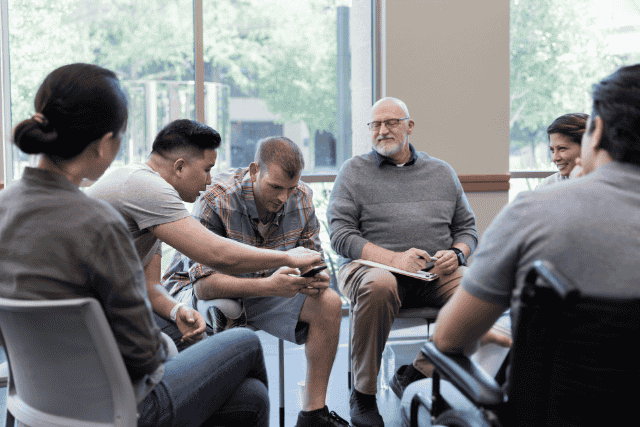
Mobile veterans clinics do more than just provide medical care. They also connect veterans with vital community resources. This is important because many veterans need help beyond just healthcare. Mobile clinics can help by:
Referring veterans: Clinics can connect veterans to local organizations that provide housing assistance, job training, and other support services. This holistic approach helps address the overall well-being of veterans.
Building relationships: Mobile veterans clinics foster a sense of community. Veterans often feel more comfortable visiting these clinics because they create a friendly, welcoming environment.
Check out the table below for some of the features of the Mobile Clinic Van that we manufacture at AVAN Mobility!
Ready to explore mobile veterans clinics?
You came to this article looking for answers about the healthcare challenges veterans face. Now, you’ve learned what mobile veterans clinics are and how they can help break down those barriers and provide much-needed care.
At AVAN Mobility, we really get what veterans go through. Our goal is to make healthcare easier for them by creating Mobile Clinic Vans that organizations like yours can use to go and meet their unique needs. We care deeply about helping veterans access the services they deserve and are leading the way in creating solutions that make a real difference.
With our solutions, organizations can serve more veterans efficiently, ensuring they receive the care they deserve and significantly improving their quality of life.
If you have any questions or want to learn more, feel free to click the button below to chat with one of our experts. And if you’re not quite ready to talk yet, that’s okay! We have more resources available for you to check out and learn how we can support better healthcare access for veterans.
Many organizations run into trouble finding funding to secure a mobile health clinic. Check out our guide on securing grants for your mobile health program.
After that, check out our guide on the ten steps to starting a mobile health clinic. You can apply these same steps for your next mobile veterans clinics! Alternatively, you can also check out the video below.
